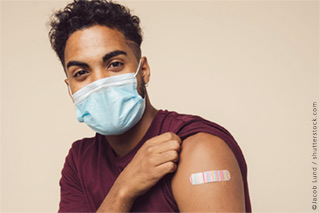For two years, a team of scientists led by Daniel Seddig from the Institute of Sociology and Social Psychology at the WiSo Faculty of the University of Cologne studied the willingness of Germans to be vaccinated during the COVID-19 pandemic. According to the study, whether people get vaccinated or not depends primarily on their attitudes towards vaccination. Social pressure, on the other hand, seems to have little effect. This has some policy implications.
Whether there will be another COVID-19 wave in autumn or winter is currently a matter of debate, even among experts, as is the possible size of the wave. However, the German debate on vaccination already reached a peak at the beginning of April, with the rejection of no less than four proposals for or against compulsory vaccination in the corresponding vote in the German Bundestag.
A general vaccination obligation thus seems to be a distant prospect for the time being. At the same time, there is widespread consensus that successful campaigns to combat the COVID-19 pandemic depend at least in part on people's willingness to be vaccinated. This makes it all the more important to understand the factors that determine people's intentions to vaccinate.
Identifying these factors was a major goal of the study "Correlates of COVID-19 vaccination intentions: Attitudes, institutional trust, fear, conspiracy beliefs, and vaccine scepticism" by Daniel Seddig, Dina Maskileyson, and Eldad Davidov from the Institute of Sociology and Social Psychology of the University of Cologne (ISS). Together with their colleagues Peter Schmidt (University of Gießen) and Icek Ajzen (University of Massachusetts Amherst), they studied vaccination intentions during the COVID-19 pandemic in Germany, using a reasoned action model, the theory of planned behaviour, human values, as well as trust and mistrust in political and scientific institutions. For the study, 5044 citizens aged 18 to 74 in Germany were surveyed online in three waves in April and August 2021 and January 2022.
The results for April 2021 (i.e., for the early phase of the vaccination campaign) now showed that people's intention to be vaccinated could be predicted predominantly by their attitude towards vaccination. Whether or not people get vaccinated is thus largely based on the personal beliefs that carrying out the behaviour will lead to positive or negative outcomes for themselves. Expectations "from the outside", such as from spouses or partners, families, friends or colleagues, on the other hand, did not play a significant role. Similarly, whether respondents thought it was easy or difficult to get vaccinated did not influence the vaccination decision.
Background factors such as the degree of trust in political or scientific institutions, health status, religiosity or political orientation had an indirect effect on people's vaccination decisions via their attitudes, according to the study. Trust in science and fear of COVID-19 supported positive attitudes towards vaccination, while negative attitudes were associated with beliefs in conspiracy theories and scepticism towards vaccines in general.
Therefore, to counteract vaccine hesitancy and promote positive attitudes toward vaccination, the authors advise policymakers, physicians, and health care providers to emphasize in particular the positive personal consequences of vaccination against COVID-19, such as the prevention of serious illness, death, and long-term health problems. This could prove considerably more effective than, for example, exerting social pressure or pointing out the simplicity of vaccination.
- The study, funded by the Fritz Thyssen Foundation, was published in the journal "Social Science & Medicine": https://doi.org/10.1016/j.socscimed.2022.114981
- Contact: PD Dr Daniel Seddig (ISS)
- Results overview of the third survey wave
